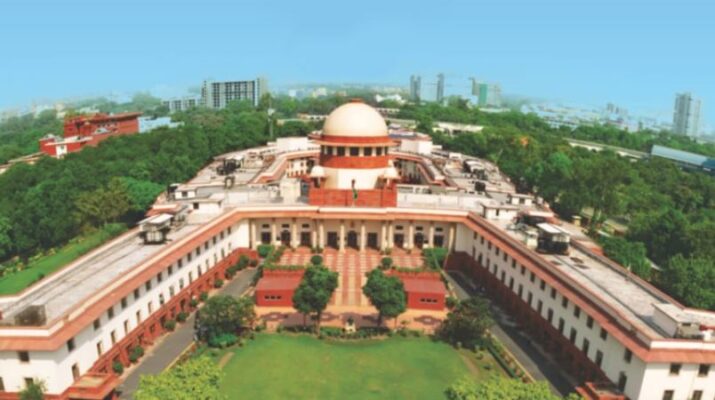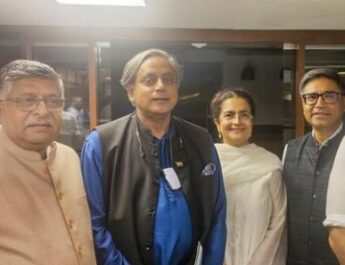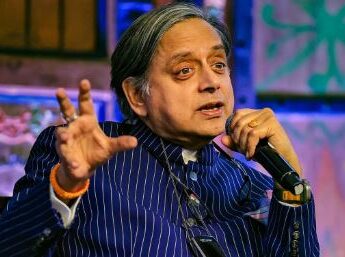Controversy: ‘Socialist’ and ‘Secular’ in the Preamble
Controversy arose during the new Parliament’s inaugural session when Members received copies of the Indian Constitution without the terms ‘Socialist’ and ‘Secular’ in the Preamble.
● Could Preamble have Been amended without altering Constitution’s adoption date.The Supreme Court on Friday agreed to examine whether the words “socialist” and “secular” could have been inserted in the Preamble of the Indian Constitution in 1976 even though the date of the adoption of the Constitution remained unaltered November 26, 1949.
● Contention of the Parties: The petition filed jointly by Balram Singh, Karunesh Kumar Shukla and Pravesh Kumar in 2020 argued that the amendment made in 1976 was “antithetical to the constitutional tenets as well as the historical and cultural theme of India” because the Constitution permits them the right to practice, profess and propagate their own religion under Article 25.
● The plea sought a direction for the Union government to declare that the concept of ‘socialism’ and ‘secularism’ referred to the nature of the republic and was limited to the working of the sovereign func- tion of the State and not applicable to citizens, political parties and social organisations.
About the Indian Preamble
● The Preamble is an introductory statement that sets out the Constitution’s guiding purpose and principles.
● It declares India as a sovereign, socialist, secular, and democratic republic, committed to justice, liberty, equality, and fraternity for all citizens.
● The Preamble reflects the aspirations of the Indian people towards building a just and inclusive society.
THE PREAMBLE
Background:
● The Preamble is based on the Objectives Resolution, which was drafted in the Constituent Assembly by Jawaharlal Nehru on 13th December, 1946 and adopted by Constituent Assembly on 22nd January, 1947.
● The Preamble has been amended only once by the 42nd Constitutional Amendment, 1976.
● Through this amendment, the words Socialist and Secular were added and the phrase unity of the nation was changed to unity and integrity of the nation.
● The words liberty, equality and fraternity in the Preamble are taken from the French Constitution.
Preamble gives an idea about the following:
● The source of the Constitution- -We the people of India.
● Nature of Indian State – Sovereign, Socialist, Secular, Democratic and Republic.
● Objectives-Justice, Liberty, Equality and Fraternity.
● Date of adoption – November 26, 1949.
● Preamble is all about 3C’s, that is Country, Citizen and Constituent Assembly.
● In the first part Preamble states that People of India have resolved to constitute India into a Sovereign, Socialist, Secular, Democratic and Republic Country.
● Secondly, the Preamble has objective to secure justice, liberty and equality to all the citizens of India and to promote fraternity among them all.
● Thirdly, it states that the Constitution is adopted, enacted and given to ourselves by the People of India on 26th November, 1949.
Meaning of the phrase ‘We the People’ in the Preamble:
● It signifies the principle of popular sovereignty, emphasizing that power resides with the citizens, not just the government.
● It forms the foundation of the Constitution’s goals of justice, liberty, and equality for all citizens.
● ‘We the People’ supports non-elite movements, such as farmers’ protests, highlighting marginalized groups’ assertions of rights in democracy.
Meaning of the words Socialist, Secular and Plural:
Socialist
● The word Socialist was added to the Preamble by the 42nd Amendment, 1976.
● Socialism advocate for equitable distribution of wealth and resources, and collective ownership of means of production.
● India follows democratic socialism which upholds the principles of mixed economy wherein both private and public sectors co-exist.
● Indian socialism derives its roots from Marxism and Gandhism, leaning heavily towards Gandhian socialism. It implies social and economic equality.
Social and Economic Equality
Social Equality
● It means the absence of discrimination on the grounds only of caste, colour, creed, sex, religion or language. Under social equality, everyone has equal status and opportunities.
Economic Equality
● It means that the state will endeavour to make the distribution of wealth more equitable and provide a decent standard of living for all. This in effect emphasises a commitment towards the formation of a welfare state.
● India has adopted a socialistic and mixed economy and the state has framed many laws to achieve its aim.
● Example – India’s socialist policies aim to reduce economic disparities through initiatives such as land reforms and welfare programs.
Secular
● The word Secular was inserted into the Preamble by the 42nd Constitutional Amendment, 1976.
● It signifies the separation of religion from the state, ensuring equal treatment of all religions by the government.
● It promotes religious tolerance and neutrality in state affairs.
● Freedom of Religion has been protected as a fundamental right.
● The Supreme Court in the SR Bommai v / s Union of India (1994) held that secularism was an integral part of the basic structure of the Constitution.
● Example: All citizens, irrespective of their religious beliefs, are equal in the eyes of law. No religious instruction is imparted in government schools.
Plural
● India’s pluralistic society accommodates a multitude of languages, cultures, and traditions, fostering national unity while respecting regional diversity.
● Pluralism serves as a model of democracy, where different groups can voice their opinions and ideas. It can be expressed as a cultural, political, or philosophical attitude.
● Diversity and multiplicity must be safeguarded and protected so that we can promote debate among the communities which is increasingly complex.
Cultural Pluralism
● Cultural pluralism traces the state in which minority groups maintain their own cultural identities while participating actively in all aspects of the dominant society.
● In a culturally pluralistic society, different groups are tolerant and can coexist without major conflict, but minorities are encouraged to maintain their ancestral customs.
Religious Pluralism
● It has been defined as “respect for the otherness of others,” religious pluralism exists when followers of all religious beliefs co-exist congenially in the same society.
● Emphasizes the acceptance and celebration of diversity, including various cultures, languages, and identities within the nation. It promotes inclusivity and unity amidst diversity.
Secularism and plurality a Part of Indian society:
● Ancient past: India has been a pluralistic society for centuries with diverse religions, languages, and ethnicities co-existing mostly peacefully. This plural ethos is ingrained in Indian society.
● Multiple religions: India is home to a multitude of religions, including Hinduism, Islam, Christianity, Sikhism, Buddhism, Jainism, and more. This diversity is exemplified by religious sites coexisting in close proximity.
● For instance, in Delhi, the Lotus Temple (Bahá’í Faith), Jama Masjid (Islam), and Akshardham Temple (Hinduism) stand as symbols of India’s acceptance and respect for different faiths.
● Ideals of tolerance, respect and peaceful existence between different communities date back historically in Indian civilization.
● India legally adopted secularism, whereby the state is separate from religion, upon independence in 1947. India’s Constitution, encompassing articles 14, 15, 19, 25, 29, and 30, safeguards the rights of minority communities.
Debate over Preamble
1.Whether it’s a part of Indian Constitution or Not :
● Berubari Union case (1960) cannot be treated as a part of the Indian Constitution.
● Keshavnanda Bharati case (1973) the Supreme court reversed it’s earlier opinion and pronounced that the Preamble is a part of the Constitution and the values enshrined must be the fundamental guiding principles for governance.
● The Preamble is neither a source of power to legislature nor a prohibition upon the powers of legislature.
● It is non-justiciable, that is, its provisions are not enforceable in courts of law.
- AMENABILITY OF THE PREAMBLE
● The question as to whether the Preamble can be amended under Article 368 of the Constitution arose for the first time in the historic Kesavananda Bharati case (1973).
● The Court held that the Preamble can be amended but the basic elements or the fundamental features of the Constitution as contained in the Preamble cannot be altered by an amendment under Article 368 .




